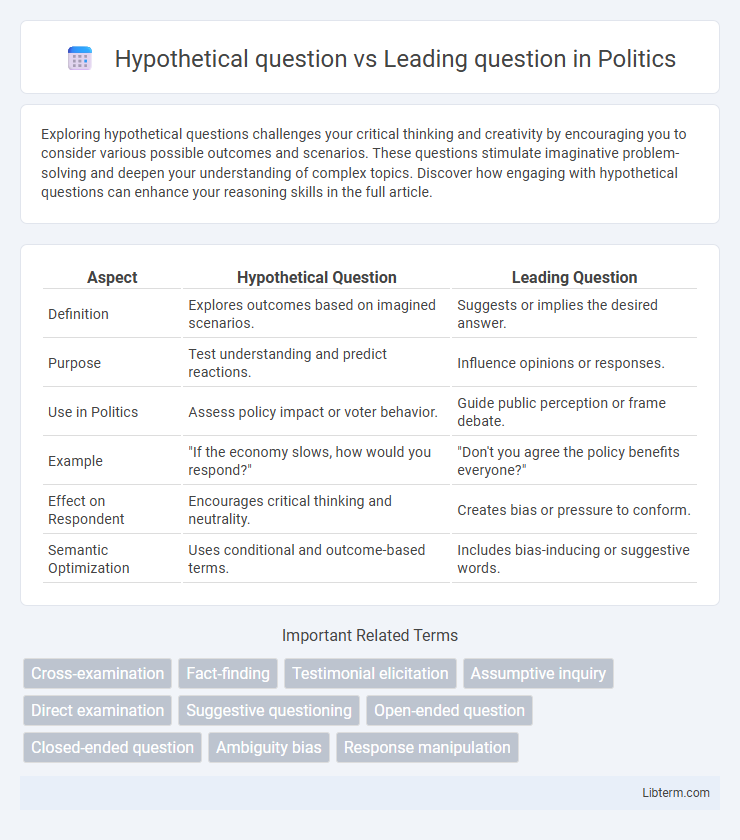Exploring hypothetical questions challenges your critical thinking and creativity by encouraging you to consider various possible outcomes and scenarios. These questions stimulate imaginative problem-solving and deepen your understanding of complex topics. Discover how engaging with hypothetical questions can enhance your reasoning skills in the full article.
Table of Comparison
| Aspect | Hypothetical Question | Leading Question |
|---|---|---|
| Definition | Explores outcomes based on imagined scenarios. | Suggests or implies the desired answer. |
| Purpose | Test understanding and predict reactions. | Influence opinions or responses. |
| Use in Politics | Assess policy impact or voter behavior. | Guide public perception or frame debate. |
| Example | "If the economy slows, how would you respond?" | "Don't you agree the policy benefits everyone?" |
| Effect on Respondent | Encourages critical thinking and neutrality. | Creates bias or pressure to conform. |
| Semantic Optimization | Uses conditional and outcome-based terms. | Includes bias-inducing or suggestive words. |
Introduction to Hypothetical and Leading Questions
Hypothetical questions present imagined scenarios to explore potential outcomes or opinions without relying on real events, often used in interviews and legal settings. Leading questions suggest a particular answer through their wording, potentially influencing responses and compromising objectivity. Understanding the distinction between these question types is essential for effective communication and accurate information gathering.
Defining Hypothetical Questions
Hypothetical questions present imagined scenarios to explore possibilities, test reasoning, or predict outcomes without relying on factual events. These questions stimulate critical thinking by asking respondents to consider "what if" situations, encouraging creativity and problem-solving. Unlike leading questions, which suggest a preferred answer, hypothetical questions open dialogue without biasing responses.
Defining Leading Questions
Leading questions are inquiries that suggest a specific answer or contain the information the questioner wants confirmed, often influencing the respondent's reply. These questions usually include biased phrasing or assumptions, which can distort the accuracy of the response. Unlike hypothetical questions that explore possibilities without bias, leading questions can compromise the objectivity of information in legal, research, and interview contexts.
Key Differences Between Hypothetical and Leading Questions
Hypothetical questions present a scenario to explore possibilities or opinions without implying a specific answer, whereas leading questions subtly influence the respondent towards a desired reply by suggesting a particular viewpoint. Hypothetical questions encourage open-ended responses and critical thinking, while leading questions can bias answers and reduce the objectivity of information gathered. Understanding these differences is crucial in fields like law, research, and surveys to ensure clarity and impartiality in eliciting information.
Purposes and Uses in Communication
Hypothetical questions stimulate creative thinking and explore potential scenarios by inviting respondents to consider possibilities beyond current facts, useful for problem-solving and decision-making in communication. Leading questions aim to subtly steer answers toward a desired response, often employed in persuasive contexts or investigative interviews to clarify or confirm information. Understanding these purposes enhances effective communication strategies by tailoring question types to elicit genuine insights or guide dialogue.
Advantages of Hypothetical Questions
Hypothetical questions stimulate critical thinking and encourage imaginative problem-solving by exploring potential scenarios without constraints. These questions help interviewers assess a respondent's decision-making skills, creativity, and ability to handle uncertain or novel situations. By avoiding bias, hypothetical questions create open-ended dialogue that reveals genuine attitudes and thought processes.
Risks of Leading Questions
Leading questions risk distorting responses by suggesting a desired answer, compromising the accuracy and reliability of data collected. In legal and research contexts, such questions can introduce bias, influencing witnesses or participants to provide misleading or false information. The use of leading questions undermines the integrity of decision-making processes and may result in unjust outcomes or invalid conclusions.
Examples of Hypothetical vs. Leading Questions
Hypothetical questions often start with phrases like "What if" or "Suppose," for example, "What would you do if you lost your wallet?" Leading questions suggest a specific answer, such as "You were at the scene of the crime, weren't you?" Hypothetical questions explore possibilities without bias, while leading questions aim to influence the respondent's answer.
Impact on Responses and Decision-Making
Hypothetical questions encourage respondents to explore possibilities and consider alternative outcomes, often leading to more reflective and creative answers that broaden decision-making perspectives. Leading questions can bias responses by suggesting a preferred answer, potentially skewing data and limiting objective evaluation in decision-making processes. Understanding the impact of these question types is crucial for eliciting authentic responses and making well-informed decisions.
Best Practices for Formulating Effective Questions
Formulating effective questions requires distinguishing between hypothetical and leading questions to elicit accurate and unbiased responses. Hypothetical questions encourage respondents to explore possibilities and think critically without imposing assumptions, enhancing the depth of information gathered. Best practices include crafting clear, neutral language that avoids suggesting answers, ensuring clarity, and fostering open-ended dialogue for more reliable and insightful data.
Hypothetical question Infographic

 libterm.com
libterm.com